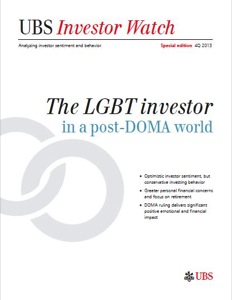
Positive attitudes are great! And a recent study by UBS finds that LGBT investors are an optimistic bunch when compared to straight investors. The LGBT community has a significantly higher belief that the long-term outlook for the U.S. economy is improving; that the worst of the economic downturn is over; and that the U.S. will make progress toward debt reduction.
These positive attitudes are not limited to the U.S. economy, and are also found in views about their personal finances as well. A majority of the LGBT investors surveyed said they expect their financial situation to improve in the next year and are very confident they will be able to achieve their future financial goals. This is not the case with the straight investors that responded with less optimism for their own financial futures.
What’s the reason for all this positivity? One likely cause is the repeal of the Defense of Marriage Act (DOMA) during the summer of 2013. From the LGBT survey respondents, 90 percent viewed this Supreme Court ruling a landmark decision or at least a step in the right direction. (The other 10 percent say the ruling is meaningless until all states recognize same-sex marriage.)
However, not all is rosy in LGBT households. We are human after all and do have some stress around finances just like everyone else. The top five concerns of LGBT investors are, in order of importance:
• Affording care in old age.
• Finding LGBT-friendly long-term care facilities.
• Marriage equality.
• Having the rights to make health care decisions for partner/spouse.
• Ensuring assets pass to partner/spouse.
The first two concerns relate to long-term care. The best way to reduce a concern, in my opinion, is to educate yourself on the matter. A great place to start your long-term care education is www.RUReadyCA.org. This Web site walks through the costs and options available for long-term care and provides links to more resources and information. The other three concerns relate to marriage equality. These issues are resolved for married couples in California. But there is still work to be done in the states not recognizing same-sex marriage.
After reading this study, I was curious to learn a little more about it and reached out to UBS for more insight. Jeffrey Hackett and Bryce Herman, both first vice presidents at UBS Wealth Management, were kind enough to answer a few questions. Jeffrey and Bryce run their own UBS group here in San Diego. It is also worth noting that UBS has earned a perfect 100 percent score on HRC’s Corporate Equality Index the past several years.
Steve Doster: Why did UBS put this study together? What did you hope to learn from this?
Bryce Herman and Jeffrey Hackett: UBS conducted this study to better understand the wealth management needs of the LGBT community so we are clear on what is important to them. Through this understanding we can deliver an enhanced and personalized client experience and better collaborate with individuals to help them achieve their wealth management goals.
Tell us a bit about the participants. Who are they? In what part of the country do they live? Do they fall into any specific age ranges or income brackets?
For this study UBS surveyed about 500 LGBT investors along with a control group of around 2,200 to see how their views of the economy, the investment landscape and their own financial futures compared to other investors.
Were there any big surprises that you found in the survey results?
What we found through this survey is that LGBT investors are more optimistic overall than the average investor about the U.S. economy, particularly over the long-term and they’re also more optimistic about achieving their financial objectives over the next year and the long-term. One surprising and interesting takeaway is that LGBT investors consider themselves significantly more aggressive than other investors, yet they hold more conservative portfolios, on average. From a planning perspective we identified that LGBT investors are more worried about long-term health care and estate issues.
I found it surprising as well that LGBT investors consider themselves to have a higher risk tolerance than straight investors, but LGBT investors hold more of their portfolio in cash and bonds. More cash and bonds typically mean a lower risk tolerance. What could be a few of the reasons for this interesting twist?
While we can’t identify the exact reasons for this finding, this point is one to be explored and addressed between an LGBT investor and their financial advisor. We do know that most LGBT investors are satisfied overall with their financial advisors. Conversations to do with matching risk tolerance to wealth management strategy and portfolio construction are a vital and necessary discussion in helping understand investors and creating collaborative plans to help them meet their wealth management goals.
Why do you think the LGBT community is more optimistic than the straight community when looking at the economy and achieving personal financial goals?
The reasons can be varied, however, these points are worthy of a thoughtful conversation between a financial advisor and an LGBT client. It’s discussions such as these that can help deepen a relationship between a client and their financial advisor through sharing of world views and perspectives.
Thanks to Jeffrey and Bryce for taking the time to answer my questions. And kudos to UBS for putting this study together and sharing it with the public. Anyone can download the full report at www.ubs.com/us/en/wealth/misc/investor-watch-lgbt.html. Keep up the positive attitude and continue to fight for marriage equality in all 50 states.
Steve Doster is a Certified Financial Planner™ professional providing commission-free financial advice for do-it-yourself investors. You can reach Steve at Doster Financial Planning by phone 619-688-1192 or email steve@dosterfinancialplanning.com. You can also follow Steve on Facebook, Linked In, Twitter, or blog to get more personal finance advice and tips.











